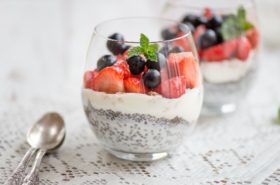
Fat has long had a bad image as far as our food is concerned. In the 1960’s it was common belief that fat was our enemy and the time when supermarkets began stocking low-fat products. However, by removing fat from products such as cheese and yogurt, it also removed their flavour and to mask the blandness that remained, the food companies added sugar and preservatives! Ironically, since the rise of low-fat products, obesity has also drastically increased. So where did it go so wrong? There are many lifestyle factors that have contributed to the rise of obesity such as inactivity, the rise of fast food chains and the increase of processed packaged foods. But one thing that we now are certain of is that consuming good quality fats, within our energy budget) won’t make us fat . Here’s why…
Several studies have now shown that many fats are good for our health. It’s easy to get caught up in the confusion of health fads and diets but it comes down to eating whole foods, including the fats for a healthy diet.
Before you go crazy on fats, It’s important to differentiate recognise the between the good fats that we should be consuming regularly and bad fats that should be minimised or if not taken out of our diets completely.
“The Good Fats”
Good fats are a natural and important part of having a healthy diet. Fats are important for our brains, hair, skin and nails, and the digestive tract. They help increase the good cholesterol and decrease the bad cholesterol. The good fats are generally unsaturated fats, including both monounsaturated and polyunsaturated. These fats are found in avocados, olive oil, nuts, seeds, and fish such as salmon, mackerel, and sardines. These foods are also packed full of nutrients important for your health.
There is a lot of ongoing research on the health benefits of certain types of fats, including research on some saturated fats that don’t have the deleterious effect on our health as we thought.
“The Bad Fats”
Over consumption of many saturated fats may increase the risk of type 2 diabetes and heart disease. These fats can be found in many processed foods, including processed meats and baked goods and other commercial or discretionary foods. If you see hydrogenated or shorting on a food label, it’s better to be avoided. These are called trans fats, which are chemically processed vegetable oils found in many processed foods and deep fried foods like fried chips. For a healthy diet, these foods are best avoided as much as possible
Easy ways to incorporate healthy fats in your diet try:
- Avocado on wholegrain toast
- Grilled salmon with herbs and lemon served with leafy green salads.
- Poached eggs on wholegrain toast with avocado and spinach
- Adding flaxseeds/flax seeds oil, chia seeds, avocado, and almond butter to a healthy smoothie
- Guacamole dip with veggie sticks
Fats help our body absorb fat-soluble nutrients from foods we eat, such as vitamins A, D, E, K, and with antioxidants. Fats also make you feel fuller for longer.
Whether you are trying to loose weight, improve healthy skin, hair, and nails, fat is your friend. But remember, if you want to lose weight you still need to make sure that you don’t eat more energy from food, including the healthy fats, than your body uses as it is the energy that comes from your fats, proteins and carbohydrates that add to your energy intake. Choosing foods that are whole and less processed, is a good start to eating a healthy and well balanced diet.
References
- Peou S, Milliard-Hasting B, Shah SA. Impact of avocado-enriched diets on plasma lipoproteins: A meta-analysis. Journal of Clinical Lipidology. 2015 Nov 2.
- Huo R, Du T, Xu Y, Xu W, Chen X, Sun K, Yu X. Effects of Mediterranean-style diet on glycemic control, weight loss and cardiovascular risk factors among type 2 diabetes individuals: a meta-analysis. European journal of clinical nutrition. 2014 Nov 5.
- Shai I, Schwarzfuchs D, Henkin Y, Shahar DR, Witkow S, Greenberg I, Golan R, Fraser D, Bolotin A, Vardi H, Tangi-Rozental O. Weight loss with a low-carbohydrate, Mediterranean, or low-fat diet. New England Journal of Medicine. 2008 Jul 17;359(3):229-41.








